Social Media Campaign Template: A Must-Have For Marketers
Use a comprehensive social media campaign template to guide you when it comes to creating effective campaigns. Discover useful resources below!


Every successful social media campaign relies on a well-structured social media strategy. Without a detailed framework, it’s challenging for social media managers to streamline campaign development and showcase the impact of their social media marketing efforts to stakeholders.
Using templates tailored for each phase of a campaign can significantly simplify the process. These templates help social media managers organize their thoughts, ensure a strategic approach, and keep everything aligned with the campaign’s goals.
In this article, you'll explore a range of templates designed for different stages of social media marketing strategy planning. These templates facilitate a clear, actionable plan and empower social media managers to drive meaningful results and maintain stakeholder alignment.
Why use a social media campaign template
A well-designed social media campaign template is more than just a guide; it’s an essential part of your social media strategy that helps streamline your planning process and ensures a seamless campaign execution. Here's how using one can improve your strategic planning.
Ensures no essential steps are missed
Running a social media campaign involves numerous activities, and it’s easy to overlook important details.
A marketing campaign template serves as a comprehensive checklist, ensuring every critical task—from goal-setting to metrics tracking—is covered. This reduces the risk of missing key elements that could impact success.
Also, a social media content plan template ensures consistency in content delivery and aligns posts with overall campaign objectives.
Saves time and boosts efficiency
A social media campaign template provides a clear starting point, with key strategy pillars already outlined. This frees up valuable time, allowing marketers to focus on the creative aspects of the campaign.
By streamlining efforts, a marketing campaign planner template helps maintain focus on high-level goals, while social media campaign templates ensure consistency and efficiency throughout the planning process.
Provides consistency
Templates standardize the planning process and ensure that each campaign follows the same strategic framework, making it easier to compare results and refine strategies over time.
Social media campaign templates for different stages of the campaign planning
Now that you know why having a social media marketing planner template is important for your social media campaign planning, here are a few campaign planning templates to help you streamline your efforts, optimize for success, and stay organized throughout each stage of your campaign.
Social media brief campaign template
What it is:
A social media brief campaign template is a foundational document that outlines the core objectives, audience, strategy, and key deliverables for a social media campaign.
Using this campaign planner template will provide clear direction to everyone involved in the campaign, from designers to the paid social team, ensuring that all parties are aligned on the goals and execution. This template serves as a blueprint for your campaign, defining its purpose, messaging, and KPIs.
Framework:
1.Campaign Overview: Begin with a brief campaign overview, outlining its purpose, the platforms you’ll use, and the key objectives.
2. Target Audience: Define the target audience with as much specificity as possible. Include demographics, psychographics, and any relevant behaviors or interests that influence how they use social media.
3. Key Messages & Tone: Identify the main messages or themes you want to communicate through the campaign. Specify the tone and voice that should be used to maintain brand consistency.
4. Content Plan: List the types of social media content you'll create for the campaign (posts, stories, ads, etc.). Include the format, style, and any key creative directions to follow.
5. Goals & KPIs: Clearly define your campaign goals (e.g., brand awareness, conversions, engagement) and how you’ll measure success through specific KPIs (reach, clicks, conversions, etc.).
6. Budget & Timeline: Include the budget allocated for the campaign and the timeline for its execution, from planning to campaign analysis.
7. Roles & Responsibilities: Clarify who is responsible for each part of the campaign, from content creation to posting and monitoring results.
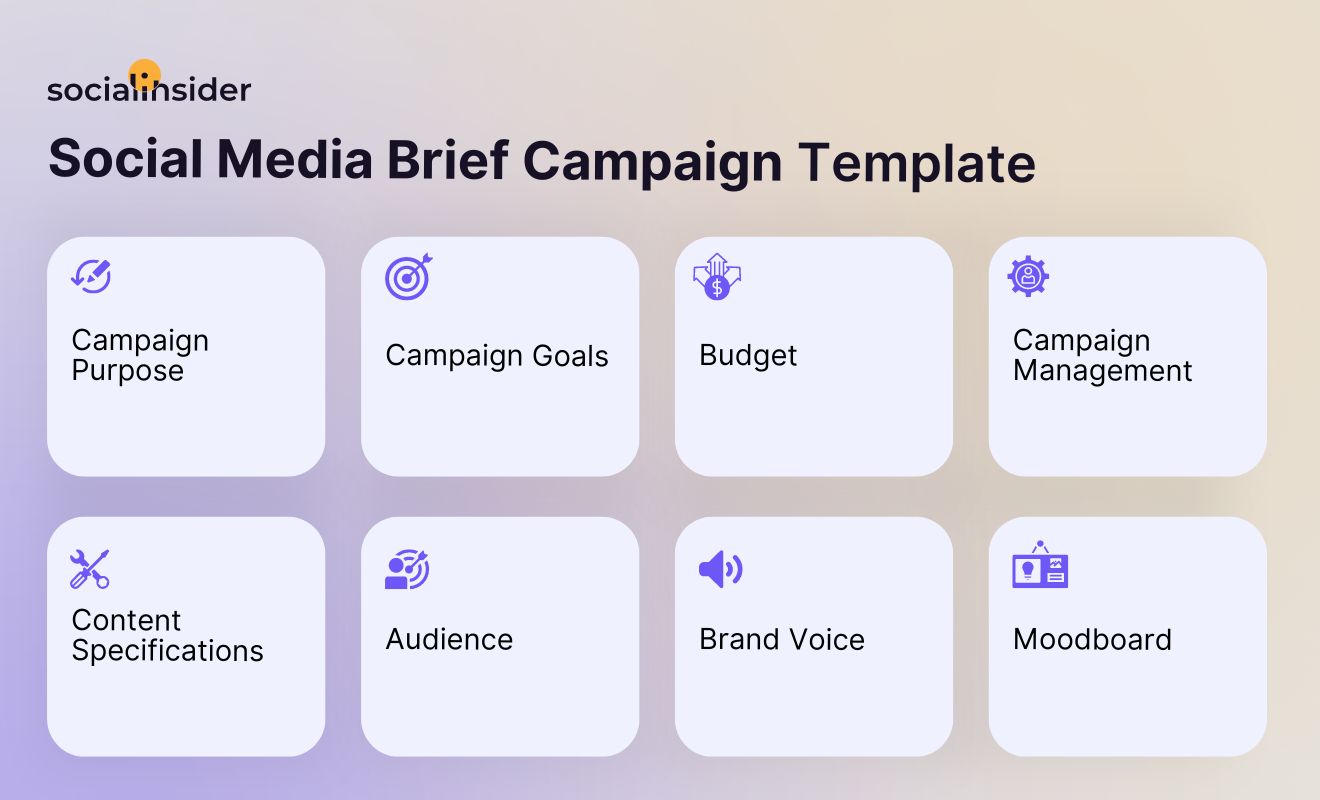
Why you need it:
- Clarity and Focus: A social media campaign brief template helps you focus on your goals and how to achieve them. It eliminates guesswork and ensures everyone involved understands the campaign's goals and requirements.
- Efficient Collaboration: The usage of this type of campaign template will ensure smoother communication between teams, ensuring that creative, content, and marketing teams are aligned on the vision and deliverables.
- Consistency: A structured template ensures that your campaigns are consistently planned and executed across different platforms and channels, which helps maintain brand voice and integrity.
Social media planner template
What it is:
A social media posting plan template is a comprehensive tool used to organize, schedule, and track all content related to your social media campaigns.
It acts as a centralized hub where you can plan out posts, assign tasks, set deadlines, and ensure consistent content flow across different platforms.
Usually, a social media content planning template typically covers daily, weekly, or monthly plans, helping to maintain a structured approach to social media content creation and publishing.
Framework:
1.Platform Overview: List the social media platforms you’ll be active on (e.g., Instagram, LinkedIn, Twitter, TikTok). Each platform may have its own section in the planner to account for unique content needs.
2. Content Calendar: Create a calendar layout (daily, weekly, or monthly) to plan when each piece of content will go live. This includes post dates, times, and any specific campaigns or themes that must be integrated into your schedule.
3. Content Types & Formats: For each post, specify the type of content you will create (e.g., video, carousel, blog post, infographic) and the format (image dimensions, hashtags, etc.).
4. Post Details: Include sections to note the post copy, accompanying visuals, and any relevant links, calls to action (CTAs), or hashtags. This ensures that all necessary elements are ready before the scheduled post-date.
5. Task Assignment & Deadlines: Assign tasks like content creation, editing, graphic design, and scheduling to team members. Set clear deadlines for each task to keep the campaign on track.
6. Goals & KPIs: Allocate specific goals to each post (e.g., brand engagement, website traffic, lead generation) and assign KPIs to measure success, like engagement rate, reach, or click-through rate (CTR).
7. Feedback & Revisions: Include space for notes on feedback or revisions. This ensures that any necessary changes are documented and addressed before the post goes live.
8. Analytics & Insights: After each post is published, record its performance metrics to track how it performed compared to expectations. Use these insights to inform future content and refine your overall social media strategy.
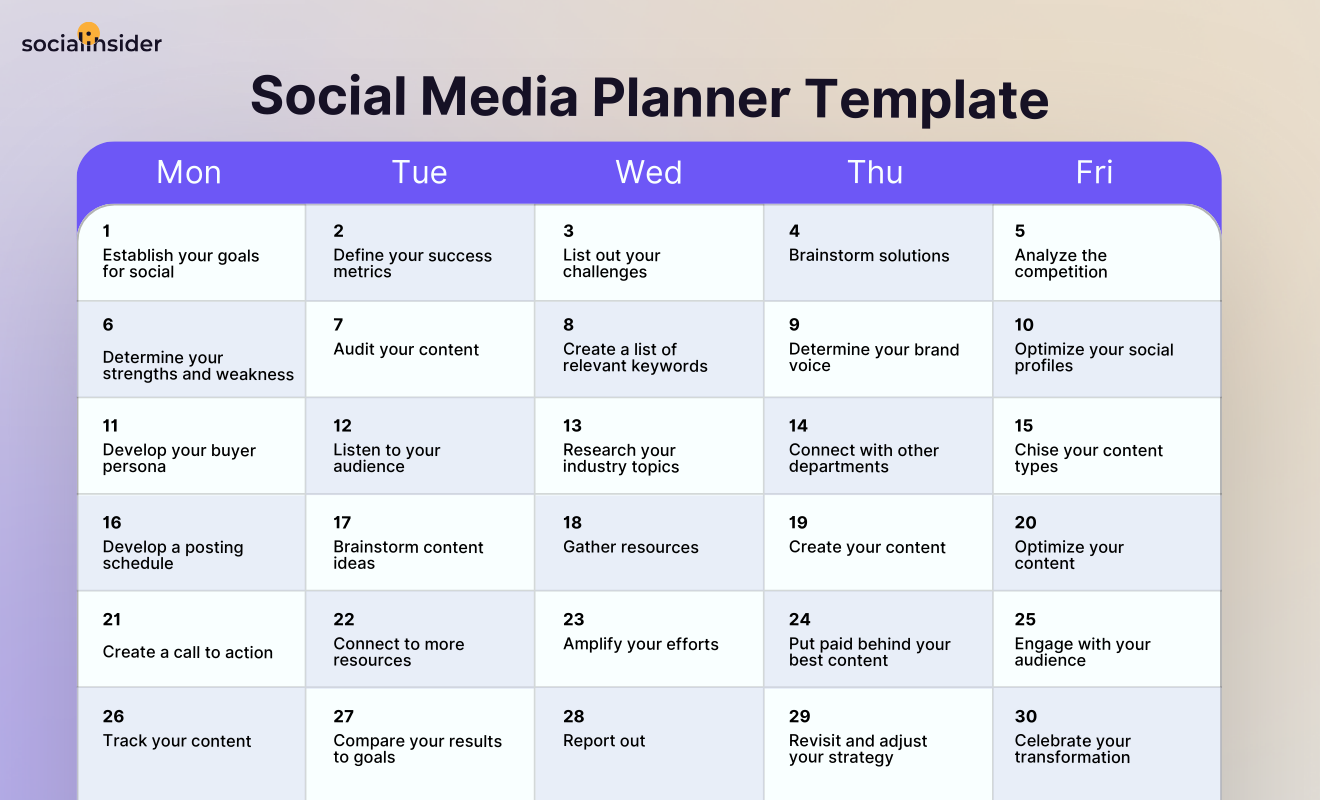
Why you need it:
- Organization: A social media post planning template helps organize your content, ensuring that posts are published consistently across platforms without gaps or overlaps.
- Efficiency: It allows teams to plan content in advance, reducing the need for last-minute scrambling. You can manage resources and allocate tasks more efficiently with a clear roadmap of what's coming.
- Strategic Execution: By laying out your posts over a set timeline, you can easily ensure that your content aligns with key events, product launches, or holidays. This helps maximize impact and timing.
- Content Variety: A campaign planner template allows you to see the bigger picture of your social media activity, helping you to maintain a balance of content types (e.g., promotional, educational, interactive).
Social media campaign reporting template
What it is:
Any social media campaign plan requires you to track essential metrics to analyze the performance of your campaign and safeguard brand reputation. This is where a social media campaign reporting template comes in handy—a structured document designed to track and analyze the performance of your social media campaigns.
It consolidates key metrics, insights, and outcomes, giving you a comprehensive view of how well your campaign met its objectives.
Also, a thorough social media audit can be conducted using this template, allowing you to compile data from different platforms into a standardized report that can be shared with stakeholders or used for internal evaluation.
Framework:
1.Campaign objectives: Start by listing the campaign's main objectives (e.g., brand awareness, engagement, lead generation). This will guide your selection of the most relevant social media metrics for evaluation.
2. Selection of relevant metrics: While different campaigns may have different social media goals, some mandatory metrics should always be included to get a full picture of performance:
- Engagement: Track social media interactions like likes, comments, shares, and saves. This will show you how well your content is resonating with your audience.
- Reach: Measure how many unique users saw your content. This indicates how far your campaign message traveled.
- Impressions: Count the total number of times your content was displayed. This helps you understand the overall visibility of your posts.
- Traffic: Monitor the number of social media users driven to your website or landing page. This is critical for campaigns aimed at generating leads or conversions.
- Conversions: If applicable, track specific user actions, such as signing up, making a purchase, or downloading a resource.
Tip: Align your metrics with the campaign’s goals. If you aim to increase brand awareness, prioritize reach and impressions over conversions.
3. Comparative data: To add context to your campaign performance, compare the results to previous campaigns or benchmarks. This helps gauge whether your efforts are improving over time or need adjustments.
4. Visual representation of data: Use graphs, charts, and visuals to present your metrics more digestibly. This makes the data easier to understand and helps highlight key insights.
5 Usage of analytics tools: To simplify the process of compiling and analyzing data, consider using an analytics tool like Socialinsider. These social media analytics tools offer predefined reports within visually appealing templates, making it easier to generate professional, shareable social media reports without manually gathering data from each platform. Socialinsider also allows you to customize your social media report, ensuring you focus on the metrics most relevant to your campaign.
6. Insights and recommendations: After presenting the data, provide a section for insights detailing what the results mean and how they align with your social media goals. Then, recommendations for future campaigns based on the data will be offered.
7. Performance summary: End the report with a clear summary that outlines the overall campaign performance, highlighting major wins and areas for improvement.
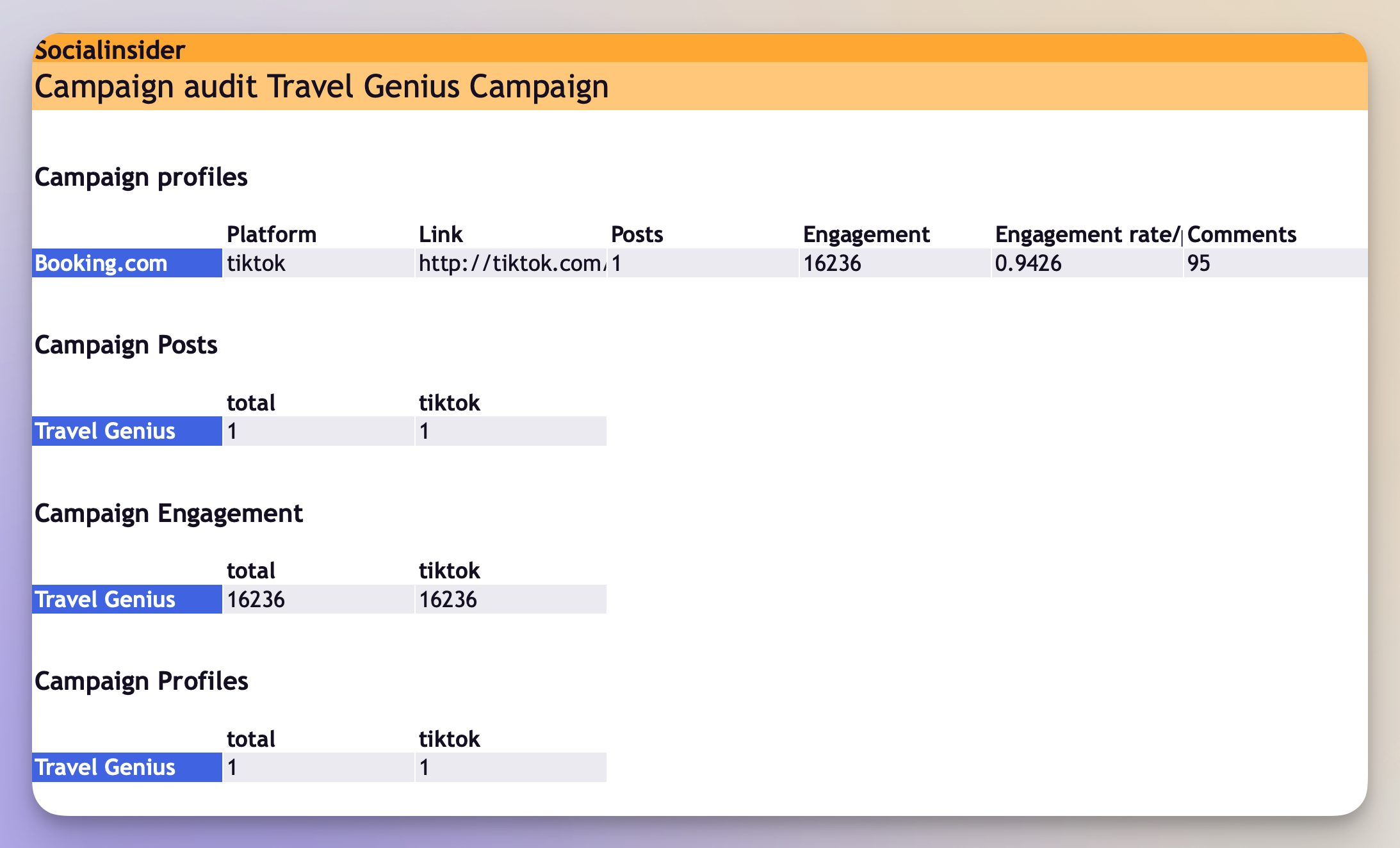
Why you need it:
- Measure campaign success: A reporting template allows you to evaluate whether your campaign achieved its objectives by providing a detailed social media analysis.
- Optimize future campaigns: Reviewing what worked and didn’t through data helps refine your social media strategy, making future campaigns more effective.
- Accountability and transparency: It provides a transparent breakdown of key metrics to show stakeholders or clients how social media efforts translate into measurable results.
Social media pitch template
What it is:
A social media pitch template is a structured document used to present a social media strategy to potential clients or stakeholders. It outlines the agency’s services, unique value propositions, success stories, and solutions tailored to the client's specific needs.
A pitch template is typically visually engaging, designed to capture attention and convey a clear message of how social media efforts can help the client achieve their goals.
Framework:
1.Introduce your team: Start with a brief introduction of your team and your agency, showcasing their expertise and experience in handling social media campaigns.
2.Define the client’s needs: Understand your client’s business goals, social media marketing challenges, and competitors. Use research or audits to outline their current social media position and the opportunities you can help them leverage.
3. Present your strategy: Clearly outline the social media strategy you propose, including content ideas, platform selection, campaign focus, and key performance indicators (KPIs). Tailor this section to address the client’s specific objectives.
4. Outline deliverables: Clearly state what services and deliverables the client can expect from you, from content creation to reporting and social media analytics data.
5. Show the ROI: Explain how your services will drive return on investment (ROI) through improved metrics such as engagement rate, reach, conversions, or traffic.
6. Provide visuals: Make sure your pitch template is visually appealing. Include graphs, charts, and infographics that make the data easy to digest and more persuasive.
7. Include case studies: Add examples of successful campaigns you’ve managed in the past, focusing on how your strategies helped previous clients achieve measurable results.
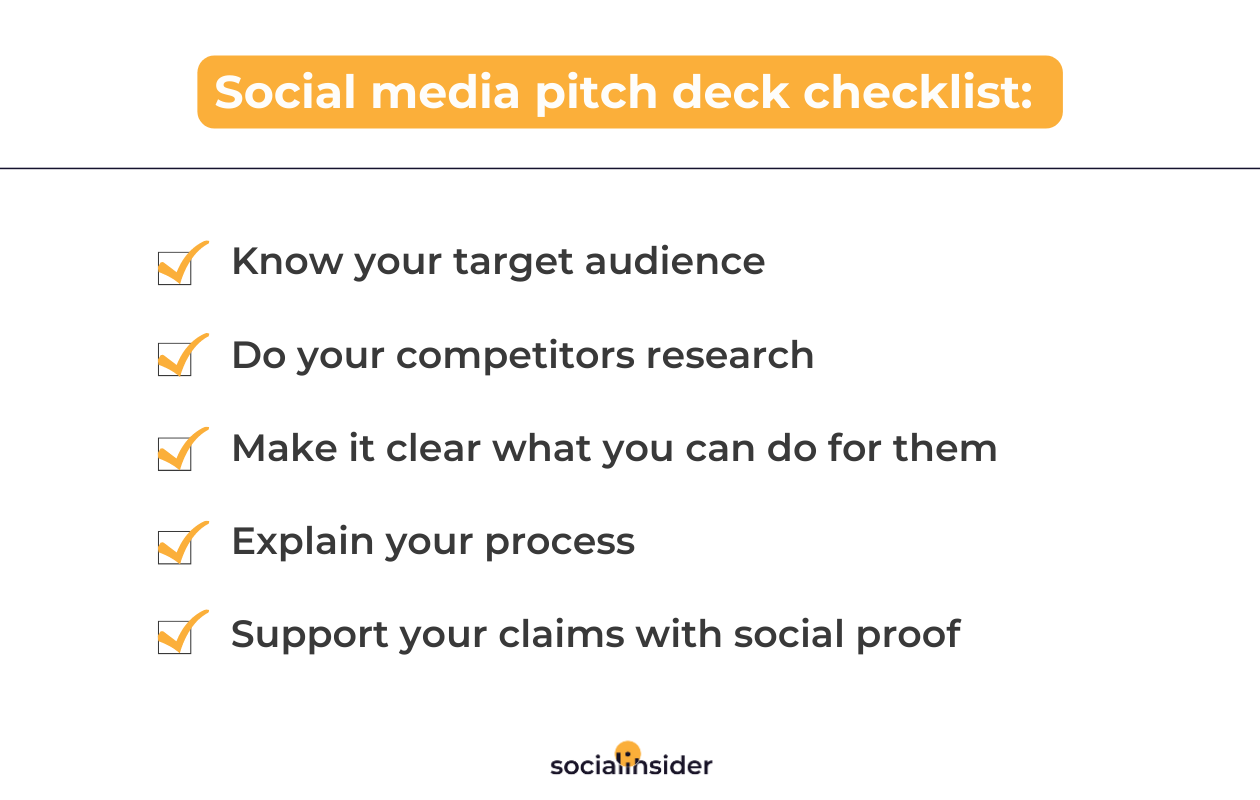
Why you need it:
- Create powerful pitches: A social media pitch template helps you craft compelling proposals by following a structured framework that includes all relevant details. It showcases a deep understanding of the client's unique needs and demonstrates your agency’s ability to sustain and support their goals.
- Structured communication: A well-organized pitch helps you communicate your ideas clearly and persuasively, making it easier for clients to understand how your social media strategies will work for them.
Templates for different social media campaign types
Here are some campaign planning templates for various social media campaign types, incorporating social media measurement and competitive insights to ensure a well-rounded strategy.
Product campaign template
What it is:
A product campaign template is a marketing campaign planning template for planning a social media campaign promoting a specific product. It covers all phases of the campaign, from building anticipation in the pre-launch phase to engaging the audience during the launch and analyzing results post-launch.
Components:
- Pre-launch: Use this phase to create anticipation. Outline a content plan with teasers, behind-the-scenes posts, and sneak peeks. Define your target audience and set a timeline for key pre-launch activities.
- Launch: Craft social media content (e.g., posts, ads, videos) to introduce the product, focusing on its features and benefits. Ensure a clear posting schedule and use the template to track real-time metrics like engagement, clicks, and conversions.
- After-launch: Analyze the campaign's performance. Document insights, review metrics like sales and conversions, and provide recommendations for future product campaigns.
Framework:
- Campaign Overview: Summary of the product and campaign objectives.
- Timeline: Detailed schedule for pre-launch, launch, and after-launch phases.
- Content Plan: Specifics of content for each phase.
- Audience Targeting: Details of audience segments, demographics, and interests.
- Metrics to Track: Engagement, reach, clicks, conversions, and sales.
- Budget: Allocation for ads, promotions, and influencer collaborations.
- Performance Review: Post-campaign analysis and insights.
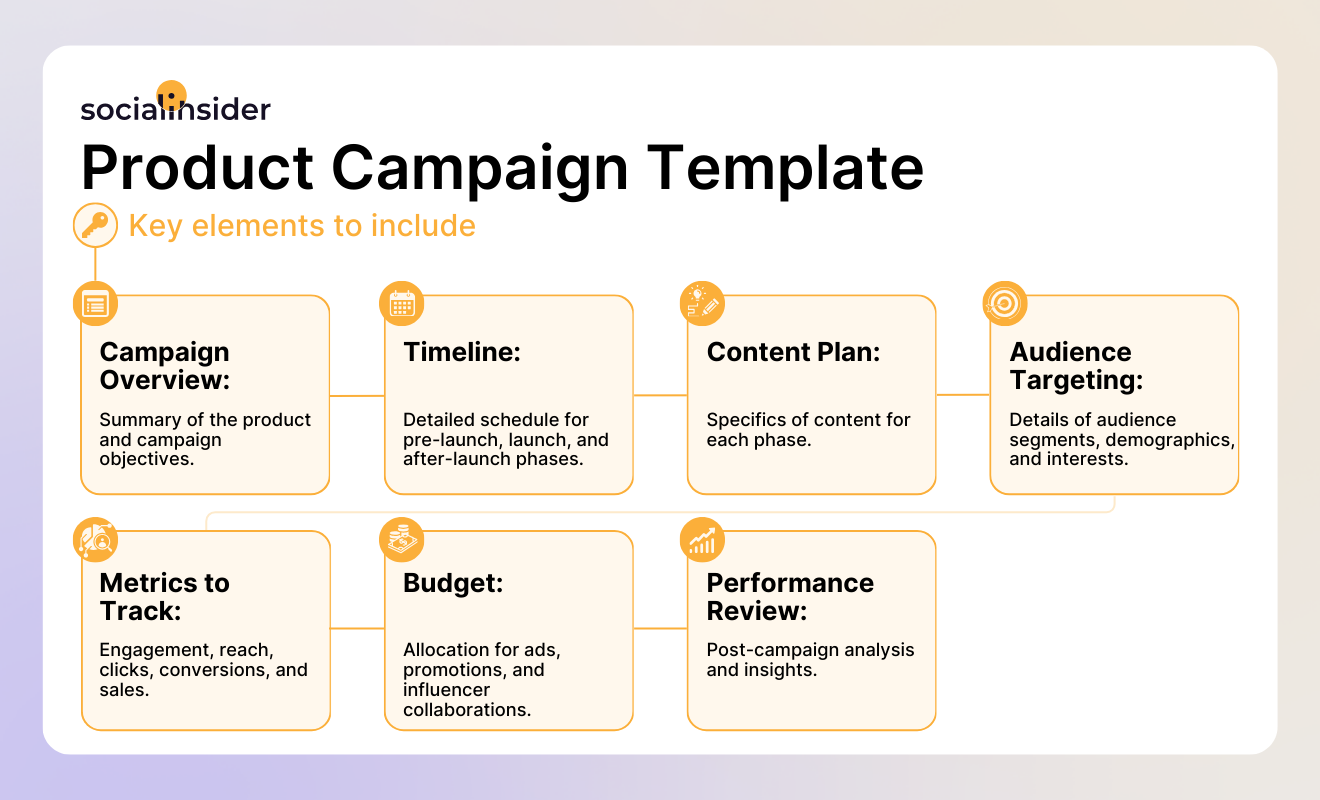
Why you need it:
It provides a structured approach to product promotion, ensuring consistent messaging and audience engagement. It also helps track performance and refine future campaigns with data-driven insights.
Seasonal campaign template
What it is:
A seasonal campaign template is a guide for planning social media campaigns tied to specific events (e.g., Thanksgiving social media campaigns, Black Friday, Halloween) or recurring brand events (e.g., Starbucks' Pumpkin Spice Latte). This template outlines the steps for leveraging seasonal trends to boost engagement and sales.
Components:
- Pre-launch: Identify key seasonal trends and set up a content plan for teasers and promotional activities. Develop a timeline outlining important dates and assign roles for content creation and publishing.
- Launch: Create engaging themed content, such as posts, ads, and contests. Use the template to execute your content schedule, targeting the defined audience segments.
- After-launch: Conduct a performance review. Use metrics to track engagement, conversions, and sales. Include recommendations for optimizing future seasonal campaigns based on the gathered data.
Framework:
- Campaign Overview: Seasonal event description and campaign goals.
- Timeline: Pre-launch, launch, and post-campaign schedule.
- Content Plan: Themed content types and publishing schedule.
- Audience Targeting: Target segments for the seasonal theme.
- Metrics to Track: Engagement, reach, conversion rates, and sales.
- Budget: Allocation for promotions, ads, and seasonal discounts.
- Performance Review: Analysis and recommendations for future campaigns.
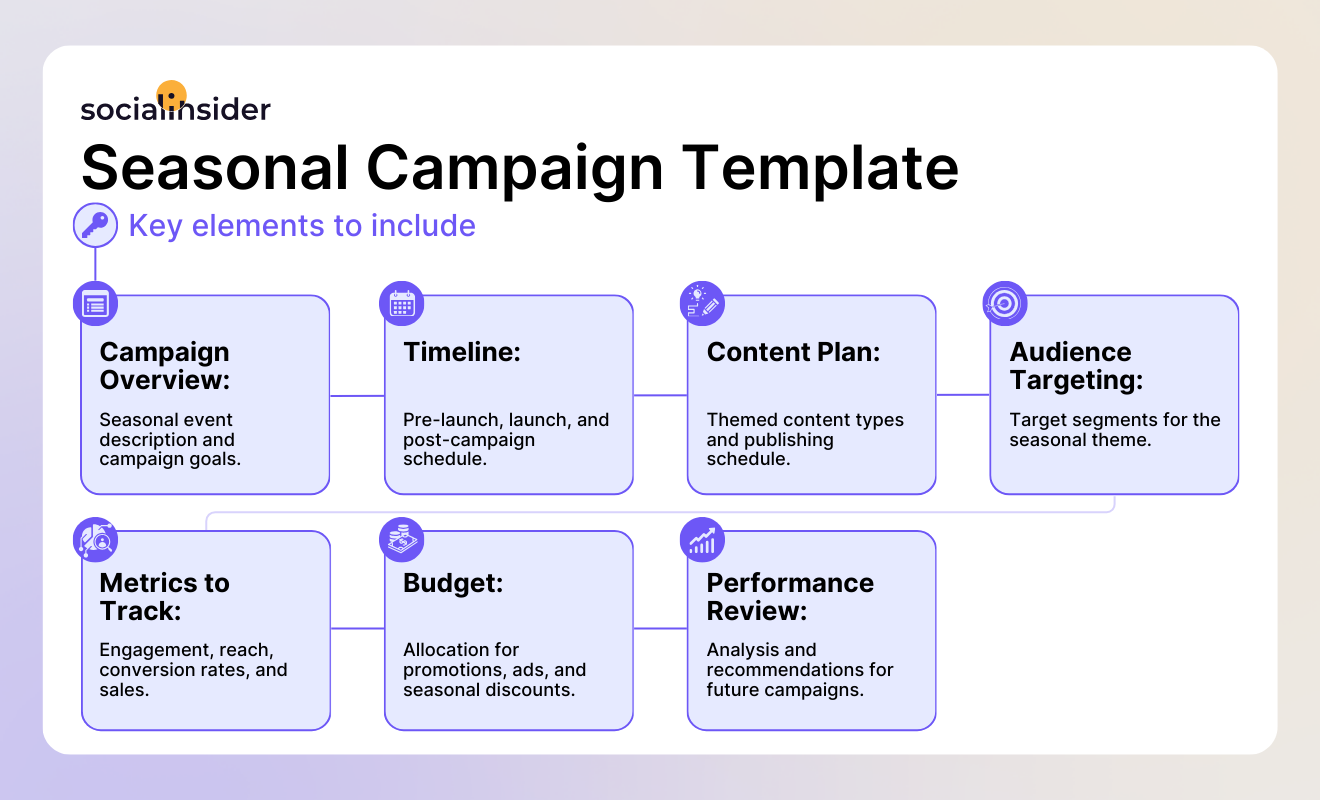
Why you need it:
- Leverage trends: Allows you to capitalize on current events like Christmas social media campaigns and social media trends.
- Consistency: Provides a framework for recurring seasonal campaigns.
- Performance analysis: Draws social media insights from past campaigns to optimize future ones.
Influencer campaign template
What it is:
An influencer campaign template provides a structured approach to planning, executing, and evaluating influencer-led social media campaigns.
It outlines steps to identify suitable influencers, collaborate effectively, and measure the impact of their promotional efforts to maximize social media ROI.
Components:
- Pre-launch: Research and identify influencers who align with your brand. Develop a collaboration plan, define content strategy, and set up a timeline for pre-launch activities like teasers or announcements from the influencers.
- Launch: Execute the planned content strategy, ensuring influencer posts go live as scheduled. Engage with the audience by resharing influencer content and hosting joint events. Track real-time performance using the template's metrics section.
- After-launch: Review the campaign's performance by analyzing metrics like reach, engagement, and conversions. Document insights and make recommendations for future influencer collaborations.
Framework:
- Campaign Overview: Objectives and influencer roles.
- Influencer Research: Identification and selection of suitable influencers.
- Collaboration Plan: Content strategy, posting schedule, and collaboration types.
- Metrics to Track: Reach, engagement, conversions, and user-generated content.
- Budget: Allocation for influencer partnerships and promotions.
- Performance Review: Post-campaign analysis, insights, and recommendations.
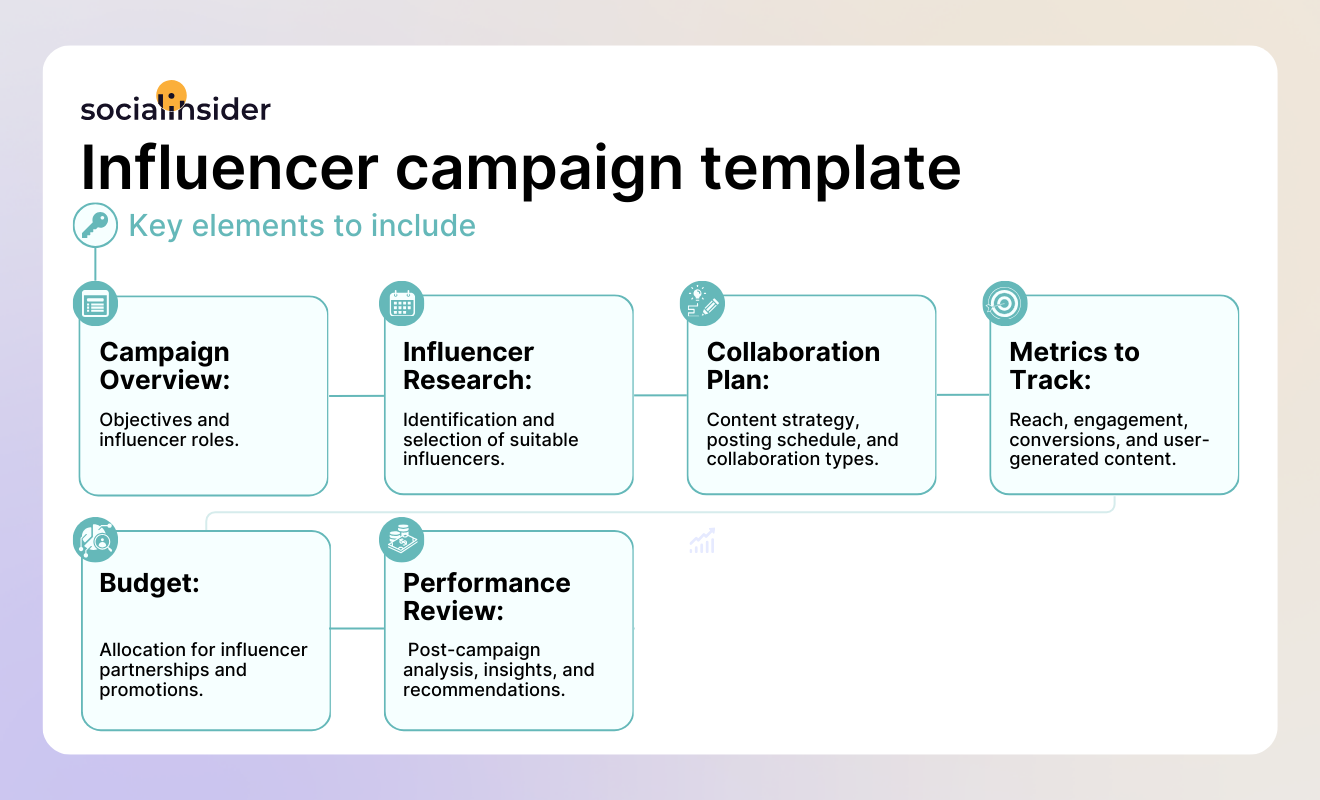
Why you need it:
- Strategic partnerships: Helps identify and build relationships with influencers that align with your brand.
- Consistent support: Guides the process of amplifying influencer content with reshares and joint events.
- Performance tracking: Simplifies the evaluation of the campaign’s success in the post-campaign phase.
Conclusion
Using a social media marketing plan template will streamline a social campaign’s strategy as it simplifies the whole process of creating a campaign, providing a framework that will ensure all the essential steps for a successful social media initiative are followed.
Use the templates mentioned above to kickstart your campaign planning, monitor progress, and optimize your social media marketing efforts.
For detailed performance tracking and visually appealing social media reports, consider using Socialinsider. It simplifies your reporting process with predefined templates tailored for different social media campaigns. Whether you’re looking to measure engagement, reach, or ROI, Socialinsider’s analytics tools provide actionable insights to optimize your strategy.
FAQs on social media campaign templates
What are some tools that offer templates for social campaigns?
Socialinsider offers a variety of predefined social media templates for reporting, making campaign analysis easier with visually appealing designs. These templates are customizable to fit specific campaign needs. Other tools like Hootsuite, Buffer, and Sprout Social also provide templates for planning, scheduling, and tracking social media performance.
How does Socialinsider help track social media campaigns?
Socialinsider offers comprehensive analytics and reporting tools to track the performance of social media campaigns. It provides key metrics such as engagement, reach, impressions, audience growth, and it also allows you to tag posts and segment them into different content pillars. With customizable, predefined templates, it simplifies performance analysis, helping you make data-driven decisions to optimize future campaigns.
Analyze your competitors in seconds
Track & analyze your competitors and get top social media metrics and more!
You might also like
Improve your social media strategy with Socialinsider!
Use in-depth data to measure your social accounts’ performance, analyze competitors, and gain insights to improve your strategy.




